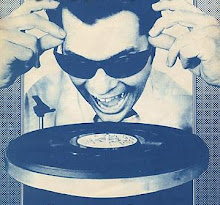 The following is an excerpt—reprinted here by permission—from Greg Kot's new book, Ripped: How the Wired Generation Revolutionized Music (Scribner, $25). They being long tired of homogenized corporate radio playing the same twenty hits (Hotel California, anyone?), "it tells the story of how the laptop generation created a new grassroots music industry, with the fans and bands in charge."
The following is an excerpt—reprinted here by permission—from Greg Kot's new book, Ripped: How the Wired Generation Revolutionized Music (Scribner, $25). They being long tired of homogenized corporate radio playing the same twenty hits (Hotel California, anyone?), "it tells the story of how the laptop generation created a new grassroots music industry, with the fans and bands in charge." Herein Radiohead reinvents the way in which it distributes music directly to its fans:
Whenever he considered the possibility of Radiohead going into business for itself, guitarist Jonny Greenwood got a little queasy. “It makes me think we’re gonna be sitting in endless business meetings talking about how to do it off our own backs, rather than sitting in studios recording music.”
But Radiohead was genuinely unsettled by what it saw as the major labels’ inability to adapt to the marketplace. The long lag time imposed by the majors between finishing an album and actually releasing it to set up a proper big-budget marketing campaign was particularly irritating. The band appreciated that its fans were almost ridiculously vigilant. As soon as word would get out that Radiohead had finished working on an album, the Internet began to buzz with anticipation. A leak of the new music would inevitably follow, and Radiohead fans were soon sharing the music and debating its merits. Inevitably, Web sites would jump in with their critiques of the still-unreleased work. It was flattering and yet frustrating for the band; increasingly, they sensed the problem was not with the fans, but with their label’s inability to keep up with how fans were consuming music.
By the fall of 2007, Radiohead had a new album ready to go, but still hadn’t pulled the trigger on any kind of record deal. It decided to release the album anyway, through its Web site. On Oct. 1, Jonny Greenwood posted a terse announcement on radiohead.com: “Well, the new album is finished, and it’s coming out in 10 days. We’ve called it In Rainbows.” So much for the big marketing plan. In the land of the major labels, Greenwood would’ve been drummed out of the public-relations academy for his utter offhandedness. For an artist of Radiohead’s stature, it was customary for a big label to plot out the details of an album release months in advance, to line up shelf space at retail stores, programming at commercial radio, and full-page ads and interviews in Billboard, Rolling Stone, and the usual print-media suspects. But for the first time in its existence, Radiohead had no such constraints. It could now effectively function as its own record company, record store, and distribution service rolled into one—at least temporarily. So Radiohead instructed its fans that on Oct. 10, it would provide an access code to a digital download of the new album to any customer willing to part with an e-mail address.
The price was left to the customer’s discretion, the virtual equivalent of a giant tip jar.
Continued...
“It’s up to you,” the checkout screen read for preordering the ten-song disc.
Do not insult Death Cab.
Radiohead’s distribution strategy for “In Rainbows” reduced the decade-long debate over Internet downloading to a single, deceptively simple question: “What’s this piece of music really worth to you?” It was a question that respected the intelligence of the potential buyer, a question that bristled with moral, ethical, economic, and aesthetic considerations. And yet it was a question that could be answered with a simple mouse click, in prices ranging from $0.00 to $99.99 (the order form didn’t accommodate three-digit dollar figures).
It was a brilliant move made even more potent by its timing. Only a week before, a federal jury in Minnesota had awarded the record industry a $220,000 judgment against Jammie Thomas for the crime of downloading 24 copyrighted songs and making them available for file sharing. Thomas was hardly alone. At the very moment her verdict was being read, more than 9 million consumers were sharing music files around America, according to media management company BigChampagne.
As one of the more marketable names in the business, Radiohead was in a position where it didn’t have to give away anything. It had the cachet to charge $10 or more for its music, and rest assured that most of its fans would gladly pay. But it clearly wanted no part of a music industry that labels its own customers as thieves. By declaring, “It’s up to you,” Radiohead made it clear whose side it was on.
The Internet exploded with Radiohead-related chatter. In the three days after the announcement, blogpulse.com, a search engine that reports on daily blog activity, showed more than a 1,300 percent increase in the number of posts mentioning the band.
The behind-the-scenes mechanics of the deal were intriguing, all the more so because Radiohead really wasn’t interested in talking about them—perhaps because it might’ve appeared unseemly to gloat. The band stood to profit handsomely from any paid download. What’s more, they didn’t have to share the money with any middlemen.
Journalist Greg Kot, whose previous work includes Wilco—Learning How To Die, writes a blog for the Chicago Tribune. Read the entire Radiohead excerpt, and Greg's other posts, at Turn It Up—A guided tour through the worlds of pop, rock and rap. Floydian readers may also be interested in this earlier post about Radio Paradise, the best thing to happen to multi-genre music listening in the public realm since WABX, the station the glowed in the dark. Oh, yeah....Radio Paradise plays both Radiohead AND Death Cab For Cutie!




